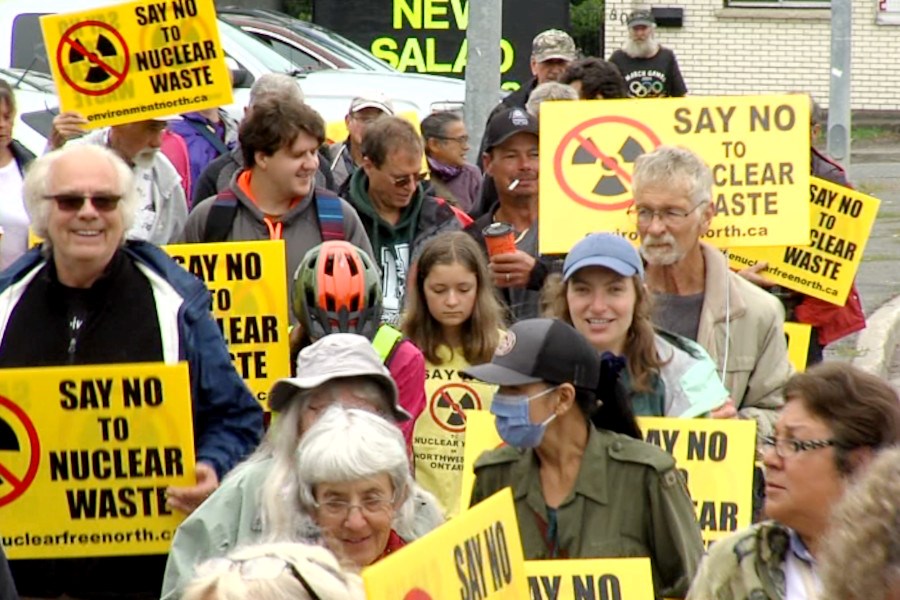THUNDER BAY — Thunder Bay’s city council will consider its position on the transportation of nuclear waste through the area on Monday, as a decision to ship the waste to the Ignace area looms.
Citizen groups Environment North and We the Nuclear Free North asked council last year to endorse the “proximity principle,” which would dictate keeping nuclear waste as close as possible to its point of generation.
That ask was referred to the city’s intergovernmental affairs committee, which will present a recommendation against the step at a council meeting on Monday.
Dodie LeGassick, nuclear lead for Environment North, expressed surprise and disappointment over that recommendation, questioning what evidence it was based on.
“I was really surprised, because I've been after them a number of times and trying to contact the people on the [committee]… and I have never, ever had contact back,” she said. “They've never responded to me, they've never contacted Environment North or We the Nuclear Free North to get more information.”
The groups point to a now decades-old plebiscite in which Thunder Bay voters expressed concerns over nuclear waste disposal.
A 1997 plebiscite asked citizens if they were in favour of nuclear waste disposal in the Thunder Bay area. Of roughly 40,000 who voted, over 91 per cent voted no.
In 2000, city council passed a motion building on that plebiscite, expressing “concern with the transportation of nuclear waste through the city of Thunder Bay.”
That motion was moved by Mayor Ken Boshcoff during his previous mayoral term.
LeGassick hopes council members will cast a critical eye on the committee’s recommendation.
We the Nuclear Free North has launched a similar call to endorse the proximity principle at Queen’s Park, delivering a long-shot petition in May bearing over 1,000 signatures to the Ontario Legislature.
It wants the province to direct Ontario Power Generation to look to storage systems at or near points of generation, rather than a deep geological repository in other areas of the province.
The Nuclear Waste Management Organization, the industry group tasked with finding a disposal solution for Canada’s nuclear waste, is considering Revell Lake, between Ignace and Dryden, and South Bruce as DGR sites.
A selection between the two sites for the $25-billion project is expected in 2024.
LeGassick calls it unfair to send waste from energy production that benefited Southern Ontario and, to a lesser degree, Quebec and New Brunswick, to Northwestern Ontario.
“We are simply the dumping ground for Southern Ontario's waste,” she said.
Wendy O’Connor, communications lead for We the Nuclear Free North, said approving a repository in Ignace would force the region to bear the burden of a nuclear waste a problem “that's been sidestepped for decades.”
“There is no solution to nuclear waste. There is no good, totally safe way to deal with it,” she said.
However, she believes a solution closer to where waste is generated at sites in Southern Ontario makes more sense.
The NWMO has responded to the groups’ concerns in the past, saying the proximity principle is a concept meant to apply to conventional waste, not spent nuclear fuel.
The agency has also argued following the principle would override a more important value of ensuring a repository is only located where local communities have had the chance to provide informed consent.
The NWMO says it has conducted extensive transportation planning to ensure the process would be safe, even in the case of road accidents.
Coun. Kristen Oliver, chair of the intergovernmental affairs committee, said its recommendation not to endorse the proximity principle campaign was motivated in part by consultation with other regional municipalities.
“We quickly learned that no communities in Northwestern Ontario were passing this principle,” she said. “When we looked at [whether] this is something that we should be advocating and lobbying for, it quickly became apparent to us that there's really no work for us at this time to introduce that.”
She also suggested it’s unclear the transport of nuclear waste would pose threats that rise above other hazardous materials that are routinely shipped through the area.
“We know that there's dangerous goods that cross through this city every day. I mean, we are in the centre of Canada and anything going from coast to coast is likely coming through Thunder Bay.
“We know that we have a really well-skilled fire department to respond, that there are emergency organizations that would of course mobilize to deal with those types of things.”
Oliver added the NWMO has stated nuclear waste would not be transported in winter, “when we do see higher instances of collisions on the highways.”
